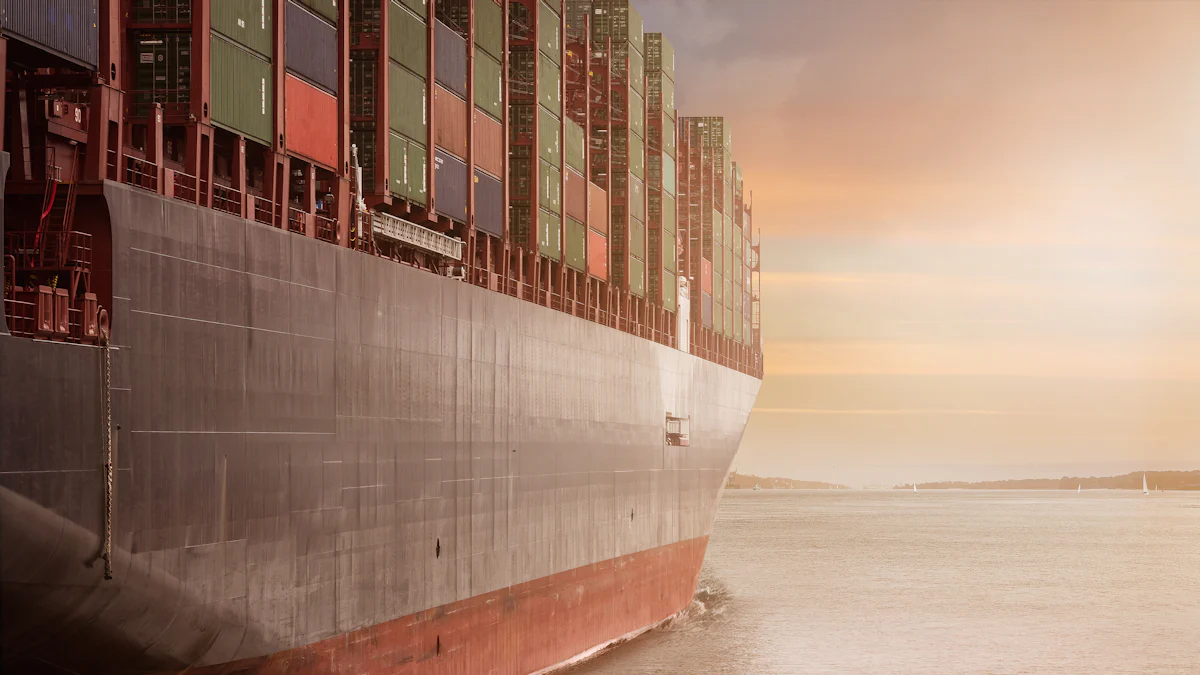Solving Supply Chain Expansion Challenges in a Globalized World

Globalization has revolutionized supply chain expansion by enhancing market interconnectedness and facilitating the seamless movement of goods, services, and information across borders. Businesses now have access to diverse markets worldwide, optimizing production processes and reducing costs through lower labor expenses and raw material prices. The scalability and flexibility offered by global supply chain expansion networks enable companies to establish resilient operations. Moreover, globalization fosters the transfer of advanced technologies, significantly reducing lead times and promoting economies of scale.
Challenges in Supply Chain Expansion

Infrastructure Limitations
In the realm of supply chain expansion, infrastructure limitations pose significant challenges that must be addressed to ensure seamless operations. One key aspect is Transportation Issues. Without efficient transportation systems, the smooth flow of goods and materials can be disrupted, leading to delays and increased costs. To mitigate this challenge, companies often invest in upgrading transport networks, implementing advanced tracking technologies, and optimizing routes for maximum efficiency.
Another critical concern within infrastructure limitations is Warehousing Constraints. Limited warehousing space can hinder the storage and distribution processes essential for a well-functioning supply chain. Companies facing this challenge may explore innovative solutions such as vertical storage systems, automated inventory management, and strategic location selection for warehouses to optimize space utilization effectively.
Financial Constraints
When expanding supply chains globally, companies often encounter various Investment Requirements that demand substantial financial resources. From setting up new facilities to integrating advanced technologies, these investments are crucial for enhancing operational capabilities and meeting market demands. Effective cost-benefit analysis and strategic financial planning are essential to navigate these requirements successfully.
Managing costs efficiently is another critical aspect of overcoming financial constraints in supply chain expansion. Cost Management strategies play a pivotal role in ensuring profitability and sustainability amidst growing operational expenses. Implementing lean practices, negotiating favorable contracts with suppliers, and leveraging economies of scale are common approaches adopted by organizations to streamline costs effectively.
Regulatory and Compliance Issues
Navigating complex International Trade Laws is a fundamental challenge faced by companies expanding their supply chains globally. Compliance with diverse regulations across different regions requires meticulous attention to detail and expertise in navigating legal frameworks. Establishing robust compliance protocols, conducting regular audits, and staying informed about evolving trade laws are essential steps in addressing this challenge effectively.
Furthermore, stringent Environmental Regulations add another layer of complexity to supply chain expansion efforts. Companies must align their operations with environmentally sustainable practices while ensuring compliance with environmental laws and standards. Implementing green initiatives, investing in eco-friendly technologies, and monitoring carbon footprint are integral components of addressing environmental regulations responsibly.
Solutions for Supply Chain Expansion
Technological Innovations
In the realm of supply chain expansion, embracing Technological Innovations is paramount to enhancing operational efficiency and staying competitive in a globalized market. The integration of cutting-edge technologies such as Automation streamlines processes, reduces manual errors, and boosts productivity significantly. By automating repetitive tasks like inventory management and order processing, companies can optimize their workflows, minimize lead times, and enhance overall supply chain performance.
Data-driven decision-making plays a pivotal role in supply chain optimization. Leveraging Data Analytics enables organizations to gain valuable insights into consumer behavior, market trends, and operational patterns. By analyzing data on inventory levels, demand forecasts, and supplier performance, companies can make informed decisions to improve resource allocation, mitigate risks, and capitalize on emerging opportunities effectively.
Strategic Partnerships
Collaborating with external partners is a strategic approach that can catalyze supply chain expansion initiatives. Establishing Strategic Partnerships with local firms fosters synergies that drive innovation, expand market reach, and enhance operational capabilities. By pooling resources and expertise through partnerships, companies can access new markets more efficiently, share best practices, and leverage each other's strengths to overcome common challenges collectively.
Government support plays a crucial role in facilitating supply chain growth and sustainability. Partnering with governmental entities provides companies with access to incentives, infrastructure development programs, and regulatory guidance that support expansion efforts. By aligning with government initiatives focused on trade facilitation or infrastructure modernization projects, businesses can navigate regulatory complexities more effectively and accelerate their expansion plans seamlessly.
Diversification Strategies
Diversifying operations is essential for mitigating risks and seizing growth opportunities in a dynamic global landscape. Market Diversification involves expanding into new geographical regions or demographic segments to reduce dependency on specific markets and increase revenue streams diversely. By tapping into diverse markets with varying consumer preferences and economic conditions, companies can build resilience against market fluctuations and geopolitical uncertainties effectively.
Another key aspect of diversification is Product Diversification, which entails expanding the range of products or services offered to cater to evolving customer needs and preferences. Introducing new product lines or customizing existing offerings allows companies to differentiate themselves in competitive markets while capturing additional market share. Product diversification strategies enable businesses to adapt swiftly to changing market dynamics and sustain long-term growth momentum.
Future Trends in Supply Chain Expansion

Sustainable Practices
Green Logistics
Incorporating Green Logistics practices is crucial for sustainable supply chain expansion. Implementing eco-friendly transportation modes, such as electric vehicles and hybrid trucks, can significantly reduce carbon emissions and minimize the environmental impact of logistics operations. By optimizing delivery routes and adopting energy-efficient technologies, companies can enhance operational efficiency while promoting environmental sustainability.
Renewable Energy Integration
The integration of Renewable Energy sources like solar power and wind energy into supply chain operations offers a sustainable solution to reduce reliance on traditional fossil fuels. Leveraging renewable energy technologies not only lowers greenhouse gas emissions but also contributes to cost savings in the long run. By investing in renewable energy infrastructure for warehouses and distribution centers, companies can achieve energy independence and support green initiatives effectively.
Advanced Technologies
AI and Machine Learning
The adoption of AI and Machine Learning technologies revolutionizes supply chain management by enhancing predictive analytics, demand forecasting, and inventory optimization. AI-powered algorithms analyze vast amounts of data to identify patterns, optimize routing strategies, and automate decision-making processes. Machine learning models enable real-time monitoring of supply chain activities, leading to proactive issue resolution and improved operational efficiency.
Blockchain Technology
Blockchain Technology offers transparent and secure solutions for enhancing traceability, transparency, and trust in global supply chains. By leveraging blockchain platforms for smart contracts and decentralized ledgers, companies can streamline transactions, track product provenance, and ensure compliance with regulatory standards seamlessly. The immutability of blockchain records enhances data integrity while reducing the risk of fraud or counterfeit activities along the supply chain network.
Incorporating sustainable practices like green logistics and renewable energy integration alongside advanced technologies such as AI, machine learning, and blockchain technology is essential for driving innovation, promoting environmental stewardship, and ensuring the resilience of supply chains in an increasingly interconnected world. By embracing these future trends in supply chain expansion, businesses can create competitive advantages, foster stakeholder trust, and contribute to a more sustainable global economy.
Enhanced collaboration among supply chain partners is essential for successful globalization. To prepare for the future of supply chain and logistics, companies should adopt several strategies: investing in talent development, leveraging technology, fostering collaboration, and building resilient supply chains are critical for future preparedness. By prioritizing these strategic approaches, businesses can navigate the complexities of global supply chains effectively and ensure sustainable growth in an interconnected world. Embracing innovation and fostering strong partnerships will be key to overcoming challenges and seizing opportunities in the dynamic landscape of supply chain expansion.
See Also
Improving Supply Chain Efficiency Through Cloud-Based Technology
Transforming Transportation: How Supply Chain Innovation is Shaping the Industry
Innovative Strategies: Transforming Supply Chain Management with Cloud Solutions
Embracing Transformation: How Technology is Reshaping Supply Chain Strategies
Optimizing Efficiency: Addressing Supply Chain Challenges in High-Tech Manufacturing
